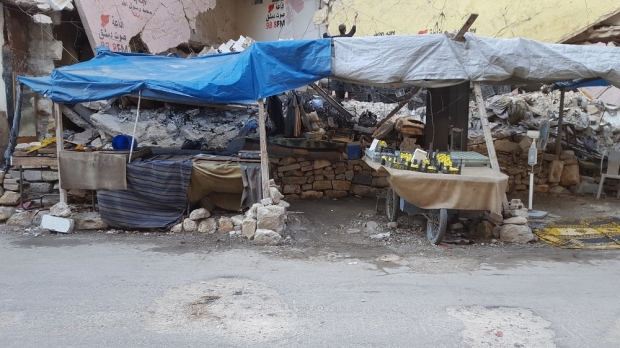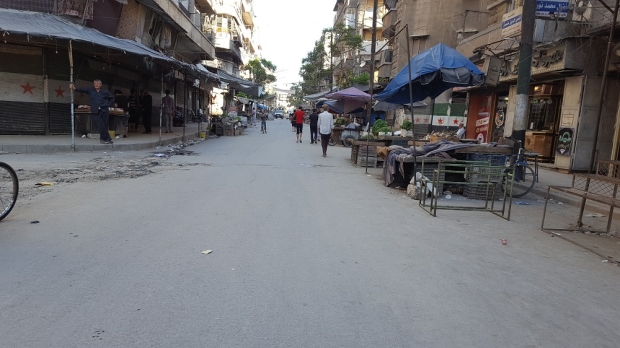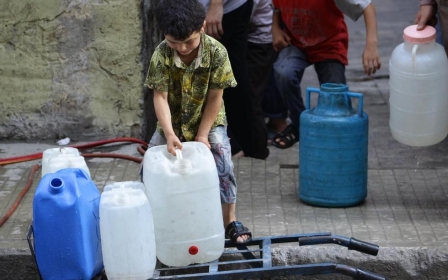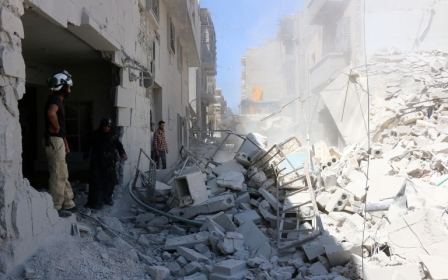'Starvation and bombing': Civilians stranded as battle for Aleppo rages
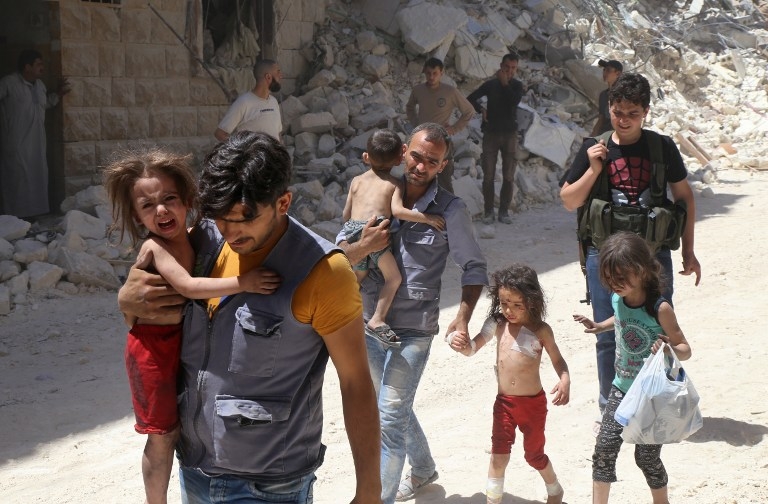
ALEPPO, Syria – In besieged rebel-held Aleppo, the situation has been deteriorating day by day. Since the last rebel-held supply road into the city was cut earlier this month, the price of food has skyrocketed.
At first, prices doubled. After a few days, they tripled. Now, some two weeks after the siege was fully imposed, certain foods and key goods have shot up by as much as 500 percent. Petrol has all but run out.
There are no taxis, buses or minibuses on the once busy streets. People either wait for hours to try and find transport or they have resigned themselves to walking despite the danger of being out in the street and in full view of warplanes that have continued to bomb as the siege has intensified.
Omar Khmis, from the rebel-held neighbourhood of Mashhad, told Middle East Eye he spent four to six hours every day just trying to buy bread.
“We are out of fuel, vegetables and fruits. Everything is gone,” he said. “We eat only one meal a day to survive because I have no way to earn a living anymore. I have some money to spend but it will be gone soon.”
On Thursday, Russia, a key ally of Syrian President Bashar al-Assad, announced that it would open humanitarian corridors to allow people to leave, but only a dozen people reportedly managed to cross over before renewed fighting blocked the routes.
The government and UK-based watchdog Syrian Observatory for Human Rights have blamed the rebels for preventing access, but sources on the ground insist that pro-government forces shelled a key crossing shortly after they urged civilians to flee.
Scores have now been left stranded, but for many who have had to endure years of brutal bombardment by Assad and Russia, leaving to government-held areas of Aleppo sounds like a fate worse than death.
“I have no choice but to stay,” Khaled Tahhan, a resident who has to walk for hours every day to try and get bread for his children, told MEE.
“Even now [that they say we] have a corridor to cross to the other side of the city that is held by the regime side, I would rather die here than be in a regime area. They destroyed and killed half of my neighbourhood and neighbours.”
He said that he was worried for his son if they left, in case the government imprisoned him and forced him to serve in the army, as has reportedly happened to scores of young men across Syria. But many others say they fear what will happen to them if they stay ahead of an anticipated tightening of the siege and escalation in fighting to retake Aleppo.
According to Tahhan, one of his co-workers tried to cross to the government side at the Bustan Qasr humanitarian crossing, but was stopped by the Free Syrian Army (FSA) that told people they could not pass for security reasons after shelling hit the area, killing one.
Despite the risks, Jamela, an Aleppo resident, told MEE she would keep trying to get to the other side, no matter what, because since the siege life had become unbearable.
“I stayed [in Aleppo] even when the shelling was crazy, but at least there was somehow food, water and electricity,” Jamela said.
“Now I can tell you, it's totally the opposite. Not only is there bombing but there are shortages of everything. There is very little safe drinking water and the generator is now off. On Thursday, the last working generator in our neighbourhood went off so now there is no more electricity.
“I plan to leave. I can’t handle any more starvation and bombing; it's too much and too big a burden to carry,” she said.
Like Tahhan’s co-worker, Jamela tried to cross from Bustan Qasr on Thursday. She said she got there at 6am and waited until 2pm, but was unable to pass because the FSA would not let her and were warning that the government would attack the area. At 12:30pm, two shells fell, wounding two and killing one, so she decided to return home, but vowed to return.
“I have had enough of being scared of seeing sudden and horrible bombings,” she said. “It's been a long time since I spent a calm day and was able to rest.”
Aleppo was once Syria’s biggest city, with a pre-war population of more than two million. Since the war started, it has been devastated and some areas entirely flattened. The government, which for years was on its back foot in the war, has been bolstered by thousands of Lebanese Hezbollah fighters, Iranian financial support and, since last September, the support of Russian planes that have pounded rebel areas.
In recent days, attacks appear to have taken particular aim at hospitals and medical facilities. Between last Thursday and Saturday, air strikes by Russia or the government hit four hospitals, the last remaining blood bank in rebel-held eastern Aleppo and a forensic pathology lab.
This Friday, air strikes also hit a maternity hospital in the Idlib province that borders Aleppo. International charity Save the Children said that at least two people were killed and three others wounded in the attack.
During the war, rebels have regularly shelled the government-held western side of the city, earlier this month killing at least 23 people and wounding 140 as pro-government forces advanced on the Castello Road, the last remaning route into the rebel-held side.
Khmis said that as a result of fighting on the eastern side, he had no access to health care near him and will have to move to another area in case there is an emergency.
“I used to go to Abd Aziz hospital in Maade Street, but it's out of service now because of a warplane strike,” Khmis said.
He said that recently he has seen an increase in bombing, with many barrel bombs dropping on his neighbourhood this month. Khmis added that he had personally seen more than 20 strikes and knew people who had been killed and wounded.
“I have heard of humanitarian corridors that have been opened by the regime, but I don't have any intention of crossing because the regime will just hit us when we try to cross through any of these corridors,” Khmis said.
“They might not catch me and put me in jail immediately, but for sure they will after settling in a government area for a while. I don’t want to die in a prison..."
Opposition “is a crime to them and they will take revenge on those who have moved to their area. I’m sure of this."
New MEE newsletter: Jerusalem Dispatch
Sign up to get the latest insights and analysis on Israel-Palestine, alongside Turkey Unpacked and other MEE newsletters
Middle East Eye delivers independent and unrivalled coverage and analysis of the Middle East, North Africa and beyond. To learn more about republishing this content and the associated fees, please fill out this form. More about MEE can be found here.


